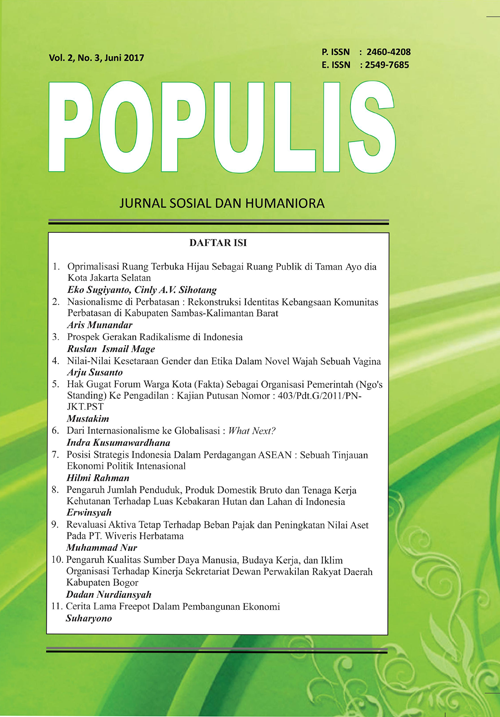DARI INTERNASIONALISME KE GLOBALISASI: WHAT NEXT?
DOI:
https://doi.org/10.47313/pjsh.v2i1.245Abstract
Since the 1990s, the word "globalization" has become a buzzword to explain how the world is undergoing significant changes. The emergence of new actors in the era of globalization signifies the nature of Plurality which is now a determination in interaction at the global level. Issues that are now beginning to vary and touch the basic essence to be managed together in the shade of governance between various actors in International System. In fact, before those years, the term internationalism became an important keyword in the contestation and constellation of world politics. Thus, the emergence of the term globalization and internationalism becomes an important marker that there has been a significant shift in world politics. In this context two questions arise; Firstly, the significance lies in the discourse on the concept of internationalism and globalization debating whether these two concepts are an evolution, a transformation, or a continuity? The core argument of this paper propose that the concept of internationalism and globalization is not an evolution, transformation, or continuity, but arises in a different context in world political contestation. Secondly, Therefore the challenges faced in the Era of Globalization are also different, this is because globalization comes from the concept of economy, while internationalism comes from the political concept. What kind of challenges will we face in this Era of Globalization in the future? In order to tackle those two questions; this paper will be divided in two parts. The two discussions made in this paper hopefully can be woven into a sufficient argument to deliver us to a picture of the challenges we will face in the Era of Globalization going forward.
References
Baylis, J., Smith, S., & Owens, P. (2013). The globalization of world politics: an introduction to international relations. Oxford: Oxford University Press.
Bentham, J. (1789/1960) Principles of Morals and Legislation (Oxford: Basil Blackwell).
Buzan, Barry, and George Lawson. The Global Transformation: History, Modernity and the Making of International Relations. Vol. 135. Cambridge University Press, 2015.
Brown, Chris, and Kirsten Ainley. Understanding international relations. Palgrave Macmillan, 2009.
Casian, Anton. The Concept and the Meaning of I (i) nternational R (r) elations. Anton Casian, 2015.
Cantori, L. J., & Spiegel, S. L. (1970). The international politics of regions. New Jersey: Prentice Hall.
Chaudary, Ganga Dhar. 2005, Politics, Ethics, and Social Responsibility of Business, Paragon books.
Ferguson, Y.H. and R.W. Mansbach (2007) „Post-internationalism and IR Theory‟, Millennium: Journal of International Studies
Fukuyama, F. (1992) The End of History and the Last Man (New York: Free Press).
Friedman, Thomas L. Hot, flat, and crowded 2.0: Why we need a green revolution--and how it can renew America. Macmillan, 2009.
Holsti, K.J. (1967) International Politics: A Framework for Analysis (New Jersey, NY: Prentice-Hall)
Göksel, Nilüfer Karasculu. 2004, Globalization and the State, Dokuz Eylul University, Izmir.
Ikenberry, John (2001) After Victory: Institutions, Strategic Restraint and the Rebuilding of Order after Major War, Princeton University Press.
Held, David, Anthony McGrew, David Goldblatt and Jonathan Perraton (1999) Global Transformations, Cambridge: Polity Press.
Heywood, Andrew (2011) Global Politics, Palgrave Macmillan, Palgrave Foundation Series.
Holsti, K.J. (1967) International Politics: A Framework for Analysis (New Jersey, NY: Prentice-Hall)
Jackson, R. and G. Sørensen (2003) Introduction to International Relations, 2nd edn (Oxford: Oxford University Press).
Jones, A. (2002) „ Interview with Kal Holsti‟, Review of International Studies, 28(3): 619–33.
Lawson, S. (2003) International Relations (Cambridge: Polity Press).
Scholte, Jan Aart. Globalization: A critical introduction. Palgrave Macmillan, 2005.
Speth, James Gustave. The bridge at the edge of the world: Capitalism, the environment, and crossing from crisis to sustainability. Yale University Press, 2008.
Weiss, Linda. 2000, “Globalization and state power,” Development and Society, Vol. 29, No.1, June (1-15).
Mas‟oed, Mohtar (1994) Ilmu Hubungan Internasional: Disiplin dan Metodologi, Jakarta: LP3ES, 1994
Moran, J. (2002) Interdisciplinarity (London: Routledge).
Ohmae, Kenichi. 1996, The End of Nation State: The rise of regional Economics, Harper Collins, London.
Pami Aalto et al, (2011) International Studies Interdisciplinary Approaches. (PALGRAVE MACMILLAN)
Philpott, Daniel (2001) Revolution in Sovereignty, Princeton University Press. Schmidt, Brian (1998) The Political Discourse of Anarchy: A Disciplinary History of IR, New York: SUNY Press.
Schmidt, B.C. (2002) „On the History and Historiography of International Relations‟ in W. Carlsnaes, T. Risse and B.A. Simmons (eds) Handbook of International Relations (London: SAGE).
Spruyt, Hendrik (1994) The Sovereign State and its Competitors, Princeton University Press.
Strange, Susan. 1997, “The erosion of the State,” Current History, 96 (613).
Suganami, H. (1978) „A Note on the Origin of the Word “International” ‟, British Journal of International Studies.
Susanto, Joko. 2012. „Menuju Trajektori Baru; Sebuah manifesto untuk studi hubungan internasional Indonesia‟. Jurnal Global & Strategis
Sylvester, C. (2007) „Whither the International at the End of IR‟, Millennium: Journal of International Studies, 35(3): 551–73.
Zimmern, A. (1939) University Teaching of International Relations (Geneva: League of Nations).
Online
http://dahlaniskan.wordpress.com/2011/10/10/agar-ayam-tak-tercekik-di-lumbung-padi/
http://www.bbc.co.uk/staticarchive/3652991fe325f62f6d4cc6a54f4eb277b23e0afb.gif
Downloads
Published
Issue
Section
License
- Hak publikasi atas semua materi informasi yang tercantum dalam situs jurnal ini dipegang oleh dewan redaksi/editor dengan sepengetahuan penulis. Pengelola Jurnal akan menjunjung tinggi hak moral penulis.
- Aspek legal formal terhadap akses setiap informasi dan artikel yang tercantum dalam situs jurnal ini mengacu pada ketentuan lisensi Creative Commons Atribusi-NonCommercial-No Derivative (CC BY-NC-ND), yang berarti bahwa hanya dengan izin penulis, informasi dan artikel Jurnal BACA dapat didistribusikan ke pihak lain dengan tanpa merubah bentuk aslinya untuk tujuan non-komersial.
- Setiap terbitan Populis Jurnal Sosial dan Humaniora, baik cetak maupun elektronik, bersifat open access untuk tujuan pendidikan, penelitian, dan perpustakaan. Di luar tujuan tersebut, penerbit atau pengelola jurnal tidak bertanggung jawab atas terjadinya pelanggaran hak cipta yang dilakukan oleh pembaca atau pengakses.










